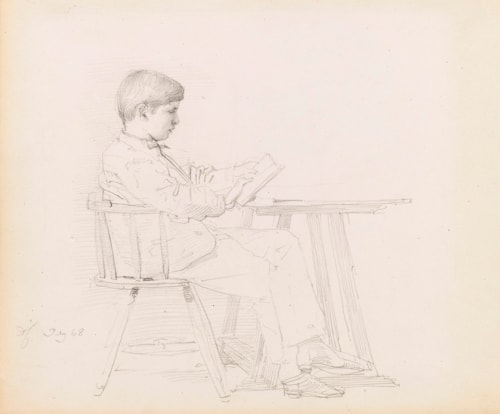
Eduard BENDEMANN
Berlin 1811 - Düsseldorf 1889
Biography
Eduard Julius Friedrich Bendemann received his initial artistic training in the studio of Wilhelm Schadow around 1826. Two years later he exhibited a portrait at the Akademie in Berlin, and in 1830-1831 he visited Italy with his teacher Schadow and fellow pupils Theodor Hildebrandt and Carl Ferdinand Sohn, spending most of his time in Rome. On his return to Düsseldorf Bendemann painted his first major work, a canvas of Captive Jews in Babylon, which was exhibited with considerable success in Berlin in 1832. In 1834 he received a commission from the Prussian crown prince (later King Friedrich Wilhelm IV) for a painting of Jeremiah on the Ruins of Jerusalem, and continued to work in a studio at the Akadamie in Düsseldorf. In 1837 he painted an allegorical fresco for the house of the sculptor Johann Gottfried Schadow, his future father-in-law, in Berlin, and he continued to receive commissions for mural paintings for the remainder of his career.
In 1838 Bendemann was appointed a professor at the Dresden Akademie, and soon afterwards received a commission for the fresco decoration of three large rooms in the royal palace in Dresden, a project that was to occupy the artist for the better part of fifteen years. He also painted a number of fine portraits, as well as providing illustrations for several books, such as an illustrated edition of the Nibelunglied, published in 1840. In 1859 he was appointed Director of the Akademie in Düsseldorf, succeeding his master Wilhelm Schadow, and was soon established as a leading figure among the cultured elite of the city. He remained director of the Düsseldorf Akademie until 1867, when he resigned on the grounds of poor health.
The year after Bendemann’s death in 1889, a large retrospective exhibition of his work was held at the Nationalgalerie in Berlin. A sizeable group of drawings by the artist is held today in the collection of the Kupferstichkabinett in Berlin, while other significant examples are in the Museum Kunstpalast in Düsseldorf.


